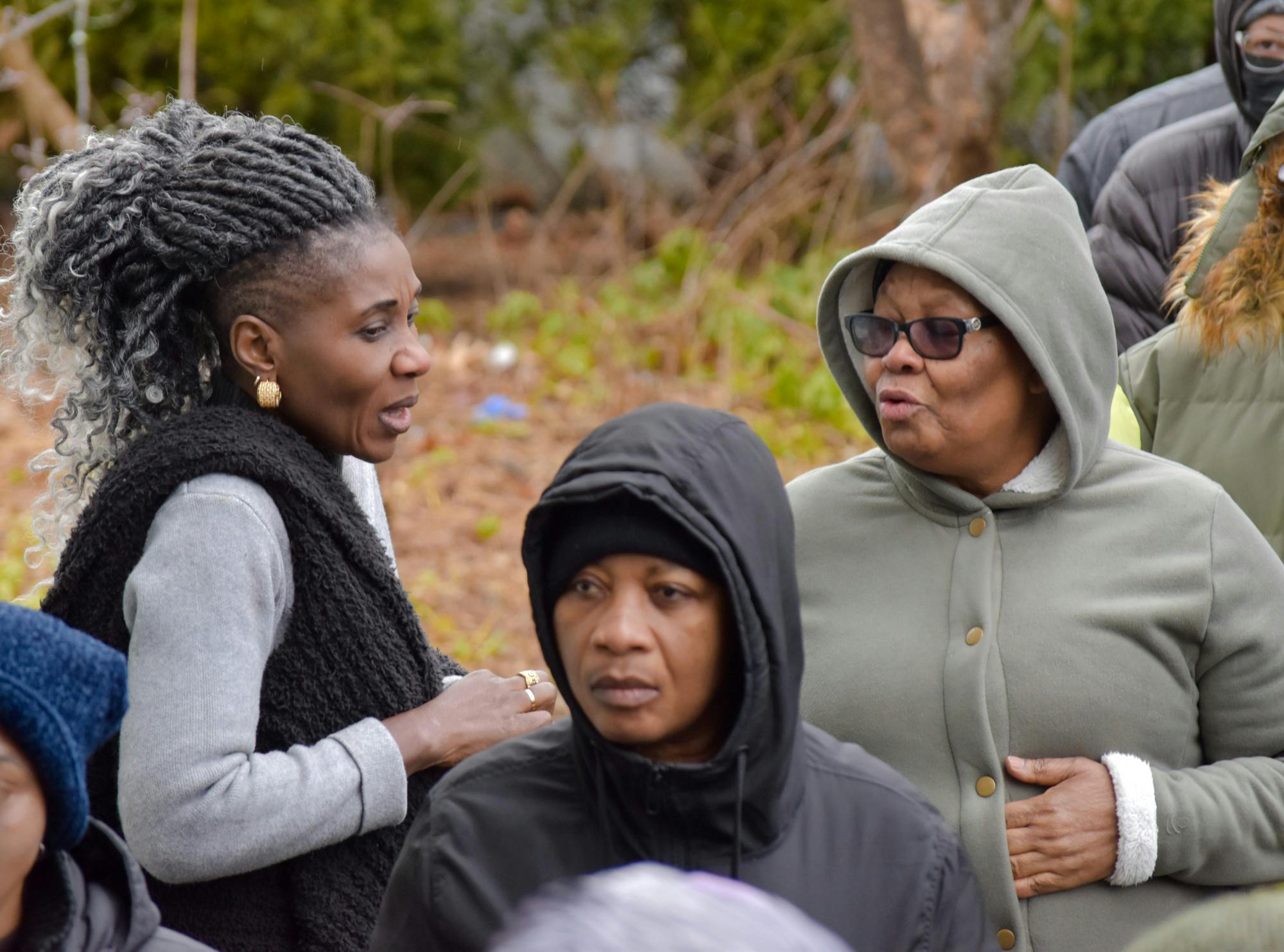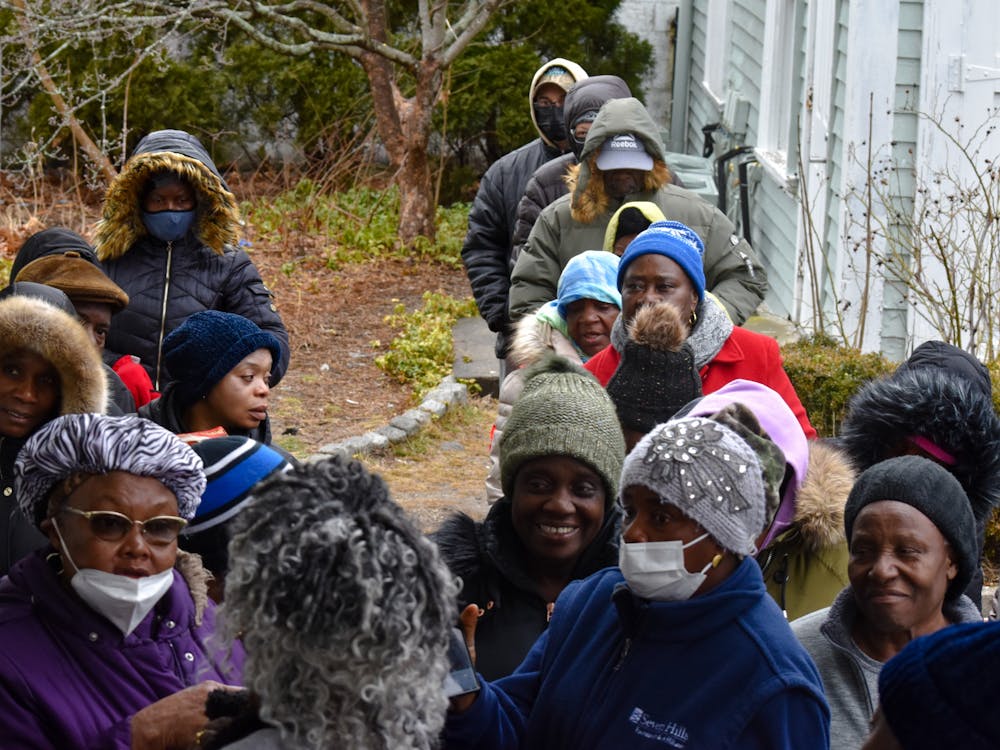Beginning at 9 a.m., more than 40 women gathered outside the Women's Refugee Care in south Providence on March 11. Volunteers carried boxes of food stocked with beans, cabbage and rice out of the food pantry in the basement, loading up hand trucks and wheeling food to the women’s cars.
Led by director Aline Binyungu, warmly called “Maman Aline” by many at the center, WRC provides a range of programs — including the weekly food drive — to meet the needs of female refugees and their families as they adjust to life in America.
Binyungu and her husband Clement Shabani founded the center in 2015. Both refugees from the Great Lakes region of Africa, the couple was inspired to open the center to support women from that area. Now, according to Binyungu, they serve “people coming from all over” including Liberia, the Ivory Coast, Haiti and Senegal.
Because of their backgrounds, Binyungu and Shabani are committed to a holistic and community-based approach to service. “Being a refugee, we saw that before becoming self-sufficient, it takes a long time because there are many pieces that have to be put together, and sometimes, it’s overwhelming,” Shabani said.
The couple originally fled their home in the Democratic Republic of the Congo out of fear of government retribution for their advocacy in support of human and women’s rights. After spending six years seeking refuge in Thailand, the couple and their five children were granted asylum in Providence in 2014. Binyungu said that it was initially difficult to adapt to life in the U.S. because “nobody spoke our language, (there was) no community (and) it was cold.”
According to Binyungu, the couple decided to center women in their work because “women are voiceless back home” and often the victims of domestic and state-sponsored violence. Shabani added that many of the women who approach the center have a “heavy history of trauma.”
The center addresses “the physical need, the social need (and) the emotional need” of refugee women through a range of programs and services because “their thoughts, their thinking (and) their well-being is everything,” Binyungu said.

She added that every Friday, the center hosts a Women’s Empowerment Group to provide the refugees with a safe and supportive environment with other women of similar backgrounds.
These sessions include group counseling with a therapist, making art and listening to music, all with the intention of facilitating a “process of healing,” Shabani said. According to Binyungu, the women participating in the empowerment group receive a $50 stipend every other week for personal needs.
Marthe Uwiduhaye, originally from Rwanda, comes to the center for the Women’s Empowerment Group because “we support one another and that makes us stronger.”
Binyungu said that the center also hosts a weekly sewing workshop with six women, connecting them with a master tailor and giving them “the space to destress.” The participants in the sewing group also receive stipends.
Nelly Wesley, originally from Liberia, said she has enjoyed the sewing classes at the center. Wesley added that after five years, she’s gotten more adjusted to life in the US. “Life in America is ... better,” she told The Herald.
Shabani said that supporting women also benefits the whole family because “when a woman is successful, we know that the whole family is successful.”
Shabani and Binyungu established the center with long-lasting community support in mind. For example, early in the COVID-19 pandemic, the center started the Give a Smile to Your Neighbor program, partnering with the Rhode Island Food Bank to provide food to families in the community who were struggling to make ends meet. Now, they serve more than 200 families and a thousand individuals a week, according to Shabani.
Marie Jen, originally from Haiti, said that she’s been going to the center to pick up food every other weekend since her friend told her about it two months ago. “It's a big help,” she said.
Shabani said that these programs are only possible with “volunteers coming from everywhere,” including the University.

Cole McCartney ’25 first got involved with WRC through the community-based learning component of FREN 1410T: “L'experience des refugies: deplacements, migrations,” which he took in the fall of 2022.
Now, he volunteers with the center on a biweekly basis, tutoring a third-grade student every Monday and delivering food Saturday mornings. McCartney said that it is both the workers and the refugees who make this organization so meaningful. He added that he appreciates that “all of the resources that go into (WRC) go right back out to the community in Providence.”
The center is committed to tackling education inequities within Providence through its Education Advocacy Program. According to the WRC website, they work with the Rhode Island Department of Education to meet the unique needs of refugee students.
Binyungu said that in addition to assisting refugees through material support and advocacy, WRC also “connects them to community.” This starts right when the refugee enters the U.S., giving newly arrived refugees a “warm welcome” complete with cultural food and celebration so that they can “rejoice for their new life,” according to Shabani.
He added that in the future, WRC is planning to add a new space — named for the Swahili word for "welcome," karibu — “where all the African community can gather together.”
“We want to keep our culture, like the mission,” Binyungu said. “We want to be ourselves, to keep our identity. We want to transfer it to our children … We cry. We celebrate lives. We stand together.”
Dana Richie is a senior staff writer for Arts and Culture and the photo chief. She enjoys using multiple forms of media to capture peoples’ stories and quirks. In her free time, she loves knitting, learning about local history and playing ultimate frisbee.





